The Night of Counting the Years (a.k.a. The Mummy)
A Screenplay by Shadi Abdel Salam
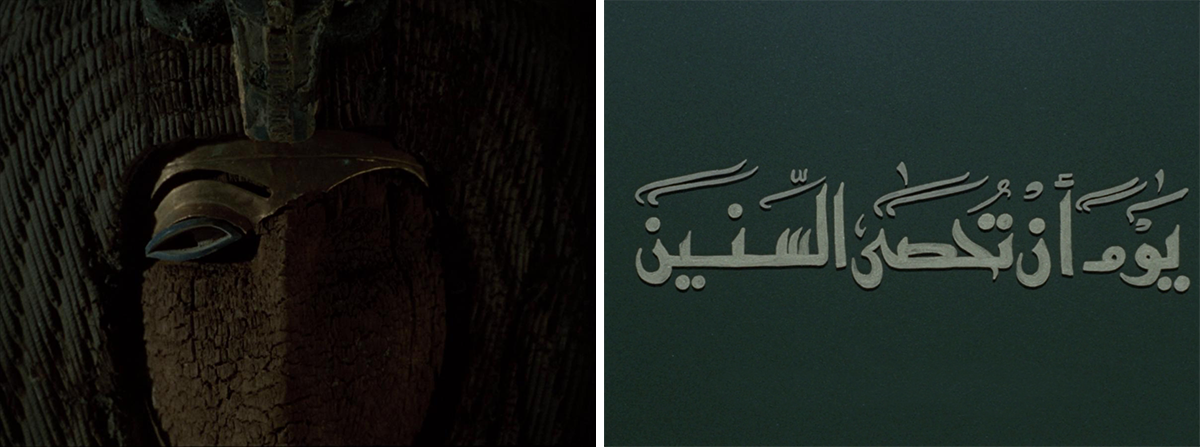
At last recognizing the virtual impossibility of guarding their ancestors’ tombs, the kings of the XXIst Dynasty removed the royal mummies to communal hiding places. The most important seems to have been that situated to the north-west of the cirque of Deir el Bahri, where a twenty-seven-foot-long underground chamber hewn in the rock sheltered thirty rough sarcophagi, including those of the greatest pharaohs: Amenophis I, Tuthmosis Il, Tuthmosis III, Ramesses I, Sethos I, Ramesses II and Ramesses III. Sequenenre, liberator of the valley of the Nile, lay also with these masters of antiquity, his face pierced by a Hyksos arrow. And this pathetic ‘crypt,’ improvised by the last kings of Thebes and their faithful scribes and necropolis inspectors (such as Butehamun), brings us back full circle to the modern inhabitants of the Theban necropolis.
Their territory stretches from the hillside dwellings to the depths of the surrounding wadis. From childhood their playground is the gebel, whose most inaccessible corners they know by heart, and where they have often located caches which they draw upon regularly like a money-box. In 1874 Maspero noticed the appearance on the antique market of figures hearing royal names of the XXIst Dynasty, of a wooden tablet inscribed in ink purchased by a collector (The Rogers Tablet, now in the Louvre), of a papyrus belonging to Queen Nedjmet, and so on. He sent inspectors to investigate […].
Christiane Desroches-Noblecourt1
Here they were concealed for the last time, and as the officials who superintended the transfer left the place a scribe hurriedly wrote upon the coffins the record of their last removal alongside similar graffiti hastily scrawled there under similar circumstances after earlier transfers beginning as far back as a hundred and fifty years before. These successive records on the royal coffins and bodies, in which one may trace their transfer from tomb to tomb in the vain effort to find a place of safety, form perhaps the most eloquent testimony of the decadence of the age [...] Here the greatest kings of Egypt slept unmolested for nearly three thousand years, until about 1871 or 1872, when the Theban descendants of those same tomb-robbers whose prosecution under Ramses IX we can still read, discovered the place and the plundering of the royal bodies was begun again.
James Henry Breasted2
None but the leading members of the Abd-el-Rasul family were let into the secret. They were solemnly sworn to leave the treasure where it had been found, that it might serve them all as a sort of mummified bank account on which to draw according to need. […] The hole was in an inaccessible spot and hidden from direct view. Small wonder that human eyes had failed to detect it for three millennia. [...]
The shaft proved to be some thirty-five feet deep. [...] Finally the main mortuary chamber carne into view, seemingly endless in the dim light. The coffins lay any which way; some of them had been rudely opened, others were still closed. About the mummies was a profusion of implements and decorative articles.
C.W. Ceram3
… every inch ... was covered with coffins and antiquities of all kinds. My astonishment was so overpowering that I scarcely knew whether I was awake or whether it was only a dream. Resting on a coffin, I mechanically cast my eyes over the lid, and distinctly saw the name of King Sethi the First, father of Ramesses the Second ... a few steps further on, in a simple wooden coffin, with his hands crossed on his breast, lay Ramesses II, the great Sesostris himself. The further I advanced, the greater was the wealth displayed – here Amenophis I, there Ahmes, the three Tuthmoses, Queen Ahmes Nefetari – all the mummies well-preserved, thirty-six coffins, all belonging to Kings or Queens or Princes or Princesses …
Emil Brugsch4
Two hundred workmen were gathered through the effort of the wakīl of the mudīriyah and began to work … forty-eight hours of relentless effort sufficed to take everything out, but only half the task was accomplished. It was necessary to transport the objects across the plain of Thebes and across the river to Luxor. Most of the coffins were lifted with great difficulty by twelve to sixteen men and it took seven or eight hours to transport them the distance between the mountain and the bank; it can be imagined what that journey must have been in the dust and heat of July … Three days later the ship El Menshiya arrived; after the necessary time had been spent in loading, she was again at full steam on the way back to Bulak [in Cairo].
Maspero5
Then a strange thing happened, perhaps the strangest incident in the whole story. From Luxor down to Kuft on both banks of the Nile the fellahin fired guns as is customary at funerals. Fellah women with loosened hair followed the steamer, sending up the old wailing cry for the dead which has probably come down from Pharaonic times […] This was their last instinctive act of homage.
Leonard Cottrell6
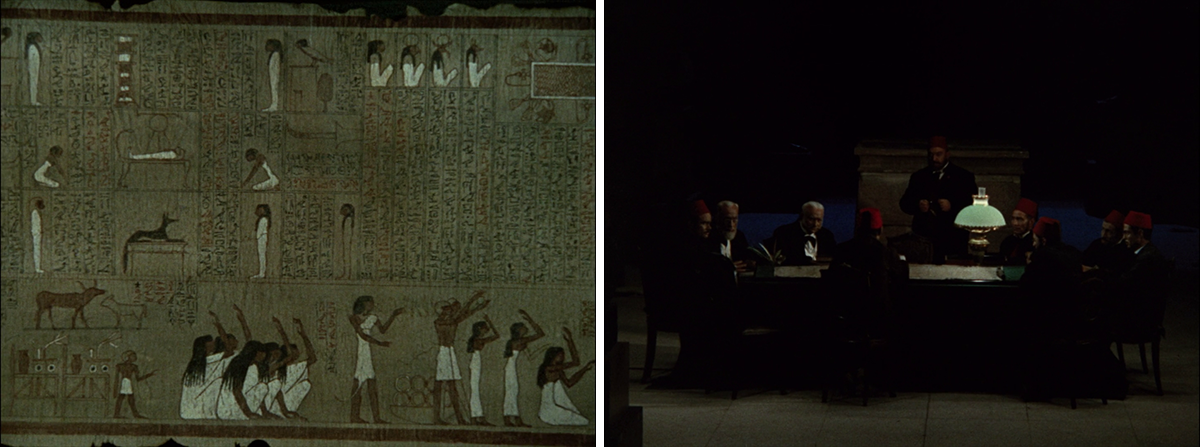
Scene I
The Archaeologists
Long pan of the Pennedjem Papyrus showing: the god Anubis; the two goddesses Isis and Nephtys; five wailing women; a mummy inside a shrine over a sledge before whom two priests offer a piece of meat and other offerings; and lastly the mummy, with the Jackal-headed Anubis standing behind it.
Interior. Night.
Corner, Cairo Museum, Summer 1881 A.D.
Voice of Maspero (reading carefully): “… Homage to thee, O thou lord of brightness, thou who art at the head of the Great House, and who dwellest in night and in thick darkness; I have carne unto thee. I am glorious, I am pure …”
Eight archaeologists, clad in their dark suits and red tarbouches, sit around a conference-table in a visit hall. They listen attentively to Gaston Maspero, who is standing in the center, a few meters away.
Maspero (continuing reading): “O grant unto me my mouth that I may speak therewith; and that I may follow my heart when it passeth through the fire and darkness.”7
Ahmed Kamal (reading): “May my name be given unto me in the great Double House, and may I remember my name on the night of counting the years …”8
Maspero: A distant echo from distant Thebes, three thousand years from today. As you might guess it is a chapter from The Book of the Dead, the recital of which gave back to the deceased the faculty of remembering his name. The Soul without a name was in a terrible plight, for the destruction of his name was equivalent to the destruction of his individuality … But I have not called this meeting to discuss The Book of the Dead which we all know.
Maspero sits and points to the papers which are on the table before Ahmed Kamal.
Maspero: That Papyrus was given to me by my predecessor, the late Mariette Pasha. It is a funerary papyrus of Pennedjem Ist of the XXIst Dynasty.
Maspero picks up a slide of another papyrus and lifts it to the lamp.
Maspero: As for that papyrus, unfortunately it was smuggled out of the country five years ago. I regret that our Egyptian Museum does not possess it hut only this photo. (He passes over the paper to his colleagues) You can see that it bears a royal name surrounded by a cartouche of Queen Nedjmet. It was bought from an unknown dealer in Thebes. From that we can deduct that someone knows the whereabouts of the yet unknown group of tombs belonging to the XXIst Dynasty, and has known it for quite a time.
Voice of an Archaeologist (thoughtfully): There is no trace of that dynasty in Thebes, Mr. Maspero.
Maspero (cutting in gently): Yes, and excavating in that case would only be a waste of time and money. Part of the tombs, as we have seen, are already known by someone. Otherwise, how could those objects have found their way into the antique market?
Ahmed Kamal is in deep thought.
Voice of Maspero: These missing tombs will be the first thing to handle the next excavation season.
Archaeologists rise, each busy with his papers, and start walking away. Ahmed Kamal looks around at them, rather anxious, till he is alone with Maspero.
Maspero: Ahmed Effendi Kamal, do you have any other suggestions before we close this season’s final meeting?
Ahmed Kamal: I wish to be in Thebes this summer for this very matter (pointing to the objects). It is well known that the Archaeology Society doesn’t work in the summer, therefore it is the safest season to smuggle the stolen objects. My unexpected arrival will cause a disturbance, and through the disturbance, new evidence is bound to leak.
Maspero: I am pleased with your suggestion. And I am sure that you can handle this matter wisely and patiently. I leave you all these documents.
Ahmed Kamal: I shall depart immediately then.
Maspero rises up. So does Ahmed Kamal.
Maspero: You shall find in Thebes a small force of mounted guards watching over the mountain of the Dead. They will offer you all possible assistance. I wish you luck on your mission.
Maspero walks away. Ahmed Kamal sits down, takes his spectacle glass and reads the documents.
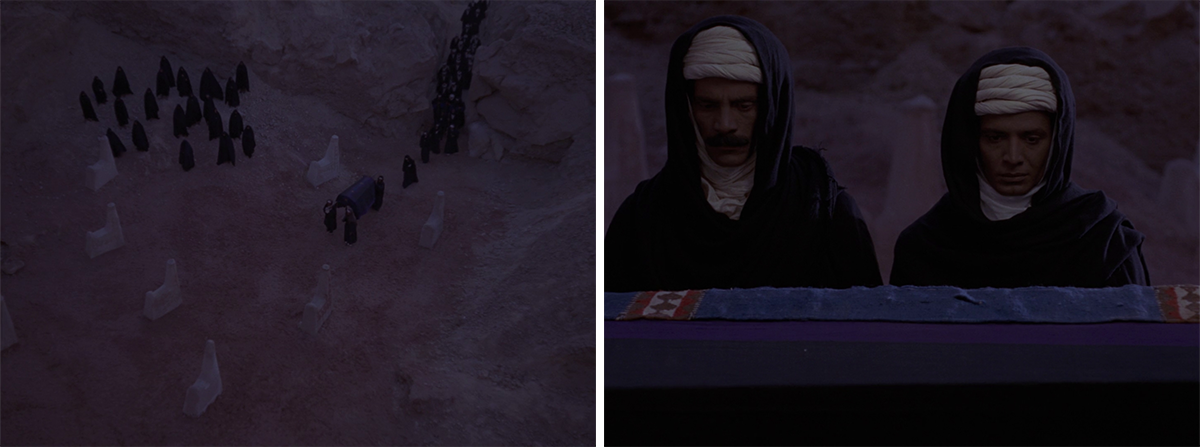
Scene II
Father’s Funeral
Exterior. Late afternoon.
The contemporary village graveyard, at the feet and in the shadow of the Mountain. In the midst of the graveyard, in a clearing, a white tombstone is prominently visible. Silence. A funeral procession is underway. A coffin carried high upon the shoulders of six men is followed by men and women in the typical Upper Egyptian mourning dress. They move slowly toward the white tombstone. Wanys, a youth, follows them. He looks back, observing in sorrow as he moves on. His brother follows in deep thought and grief. He in turn is followed by two elderly men: his uncle and a relative. The procession slows down. Tense with sorrow, Wanys and his brother stand in deep reverence looking at the coffin before them. A hollow silence, then the faint wailing sound of women. Suddenly, a hand removes the elaborate cloth covering the wooden coffin (obscuring Wanys and his brother fora second). A woman’s shrill wailing cry pierces the silence. The procession stands aside making way for an elderly lady in black: the mother of Wanys. She advances white weeping past the returning empty coffin and stands alone at the side of the white tombstone as two men lift up a huge stone slab and place it down with a thud, thus covering part of the dark tunnel-like opening at the foot of the white tombstone out of which they came. Mother falls to her knees. A feeble cry. The tears rise in Wanys’ eyes. He lowers his head and weeps.
Herbs and pink flowers are scattered tilt the whole frame is completely covered with their delicate hue.
The distant sound of galloping horses. A mounted guard, riding at full gallop, is seen high on top of the mountain cliffs. The galloping sound rises.
The whole procession stands still around the white tombstone. With the exception of Wanys and his mother, who, deep in sorrow, silently weep, all look towards the mountain. Uncle turns back, looking towards the procession, then, with resolute steps, advances. He moves calmly past the white tombstone and Mother weeping beside it, and halts at a short distance, to face Wanys and his brother, who are now seen alone facing him.
Uncle (solemnly after a moment): Your father, may he rest in peace, made you for this day to bring prosperity to his tribe and honour his name …
The galloping sound rises again. Brother looks in its direction.
Uncle (resuming clearly): … to bring prosperity to his tribe and honour his name …
With downcast eyes, as if praying:
Uncle (slowly and conventionally): Here before my brother’s grave, I vow to pass to you, his sons and heirs, the secret of all that is, and shall be, ours ...
He carefully observes the brother with a harsh and steady stare, then looks up.
Uncle: So long as this mountain stands. (Louder and clearer) A blood secret to guard with your lives … (looking severely at Brother) and, if need be, to pay for with your lives. A trust passed from father to son since time unknown.
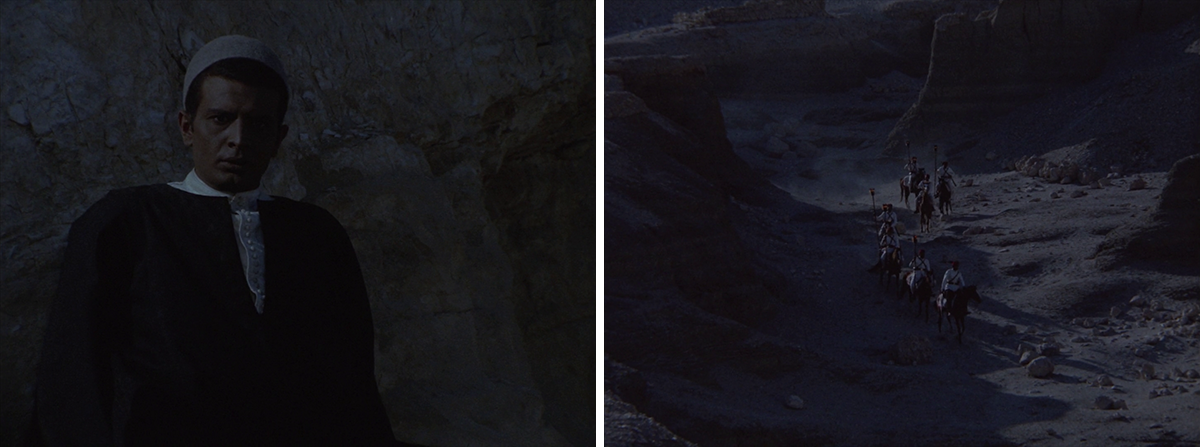
Scene III
The Mountain by Night
Exterior. Night effect.
Luxor. The cliffs at Deir el-Bahri. The mountain slope and the distant valley. A man gradually rises up in frame: Relative. He stands, looks cautiously downwards, then swiftly moves on. Another man rises similarly: Uncle. A third man emerges: Brother; followed closely by a fourth man: Wanys. Silence. Suddenly, the distant hut clear sound of hooves clattering. In the valley down below, mounted guards, holding torches, are seen passing by the ruined temple. Uncle stands still, alert, looking carefully down before him. He swiftly stretches his arm backwards, signaling “Stop” to Brother and Wanys, who were continuing their movement behind him. They stand motionless – stuck to the mountain. The guards pass on and disappear. Uncle signals Relative to proceed. Relative crawls from his hiding place among the rocks towards the cliff’s edge, looks carefully down below … aside … waits … as if listening. He moves further away, halts, repeats observing the valley. He then stands and moves further up, climbing the steep path, and disappears among the rocks. Uncle, still holding back Brother and Wanys and following with his eyes Relative’s upward movement, gradually lowers his arm and moves a step forward – still looking up. The brother follows his uncle's movement restlessly.
Brother (indignantly): Why are we using this path to dim b the mountain?
But Uncle, still looking up, ignores Brothers’ question.
Brother (boldly): It is a goat’s path.
Uncle vaguely replies without turning to Brother.
Uncle (flatly): It is safer.
Brother lowers his eyes.
Brother (spontaneously): Safer for jackals.
Uncle, with a piercing look, sharply turns half-way to Brother.
Uncle (sternly): Keep this boldness for the Effendies and their guards who are spreading like a sickness all over the mountain.
Voice of Relative (whispering from above): Come … It’s safe now.
Uncle (quietly commanding): Follow me!
Uncle turns around to Wanys.
Uncle (sternly): Wanys … Do you feel faint?
Wanys rises up from his hiding place among the rocks still looking absently away toward the valley. He then turns and faces Uncle.
Wanys (thoughtfully): Nothing. But it is humiliating to hide.
Wanys moves towards Uncle and Brother with down cast eyes – like one humiliated. He halts beside them obediently, waiting for the order to proceed.
Voice of Relative (whispering from afar): Quick cousins!
Uncle turns around and proceeds forward stern and worried. He rises towards Relative. The Zatter lowers a helping hand. Uncle holds it and, with the aid of his cane, rises to the rocks above. Relative lowers his hand again, this time to Brother. But the Brother ignores his help, climbs alone, and, in turn, offers Wanys a helping hand. Brother and Wanys follow Uncle. Relative, left alone, withdraws his outstretched arm, amazed yet proud. Then he moves past Wanys and his brother.
Relative: Follow me!
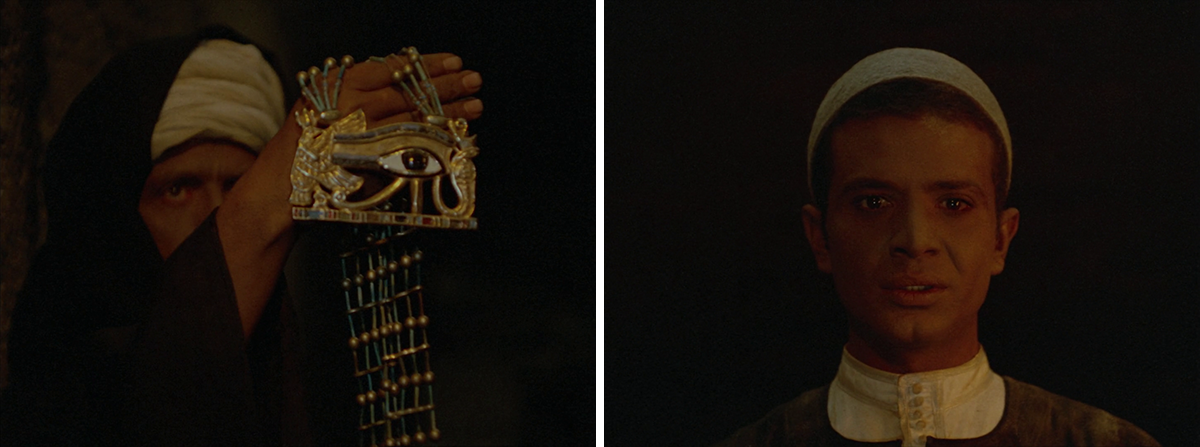
Scene IV
The Tomb
The tomb consists of a vertical shaft, open to the sky and leading to a narrow tunnel roughly cut in the mountain rocks. The tunnel leads toa low roofed burial chamber piled up with sarcophagi and other antiquity objects. A rope, and hands in a descending motion, followed by feet. A heavy thud. Gradually, Uncle’s face rises up in the frame as Brother drops down. Another heavy thud. Then Brother rises up behind Uncle and stands peering into the darkness before him. Uncle moves forward into a dark tunnel cut in the mountain-rock. Wanys touches ground, kaves the rope, and moves to his brother's side. Sound of two flints knocking. The two brothers wok questioningly at one another, then in the direction of Unck. A spark is seen, then gradually a jlame. Unck is visibk at the tunnel's end, kneeling, a torch in hand. Suddenly, a heavy thud. A dark figure that has just dropped down at the foot of the shaft rises up in a mist of dust: it is the relative. He moves forward, passing Wanys and his brother with the tense expression of an attacking hawk. They follow his movement with their eyes. Unck rises and hands a torch to the approaching Relative. The Zatter holds it firmly and passes on. Unck turns and faces the two brothers. After a moment’s silence:
Uncle: Follow, observe, and do not question. Here you are hut grains of sand in this mountain.
Brother approaches. Unck woks thoughtfully at him.
Uncle: Should Wanys wait here till we return?
Wanys stands motionless, silhouetted against the faint shaft-light. He looks back humbly at them.
Wanys: I am here because it is my father’s wish.
Brother (thoughtfully yet firmly): He shall know all that I shall know.
The Uncle looks at them proudly, touched.
Uncle: Said like a man! Truly the heirs of my brother!
Wanys approaches and stands beside his brother. They all start to move round the corner. Wanys is bewildered as he turns the corner of another ruined tunnel. Light reaches him, revealing Relative standing motionless, waiting with downcast eyes, torch in hand. The low-roofed chamber is piled up with fantastic objects: masks – some faceless; an empty sarcophagus, another and another; a peaceful face (Amenophis). A covered sarcophagus in black and gold is visible from among the bodies and hands of Uncle, Brother and Relative. The lid is thrown aside, revealing the mummy. Suddenly and unexpectedly a nervous knife is plunged into the mummy, brutally tearing the bandages. Wanys observes, sweating, bewildered, a horrified expression on his face. A hand nervously tears the rest of the bandages away. A golden pectoral (with the design of an eye) rests peacefully on the mummy’s chest, glittering in the torchlight. The nervous hand reaches for it and grabs it – but it is fastened round the mummy’s neck. In a second, an ax hits the neck a disastrous blow, separating it from the body. The pectoral is lifted up in the air and delivered calmly to Uncle's waiting hand, who turns around and holds it before Brother’s face.
Uncle (with calm authority): Take this to Ayyub the dealer.
Sound of footsteps running away. Brother looks back towards Wanys. But Wanys has disappeared. There is only a dark emptiness in his place.
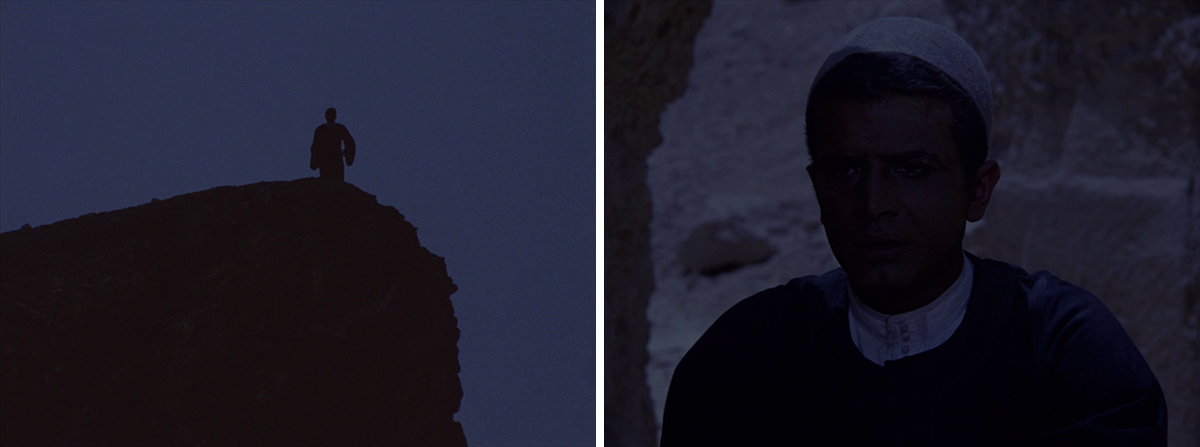
Scene V
The Descent
Wanys rises to the mountain top. He runs down the steep slope, appearing and disappearing among the large rocks. He stumbles but quickly resumes his descent, lower and lower. He stumbles once more and falls flat on his face. He rises to his feet, breathing hard, and horrified. Then suddenly a thought crosses his mind . He stands dazed for a moment then thoughtfully descends again. He runs faster and faster. A feeling of anxiety dominates him. He looks searchingly before him. He turns a bend and halts trembling with emotion. Hesitantly, he steps forward. Before him, not far away, the white tombstone, his father’s grave, rests peacefully, its mourning flowers undisturbed. He turns violently away from it, hopeless and lost. He knocks his head against a rock in torment.
Wanys (fervently, almost choking): What is this trust that makes me fear to look upon you, my father?
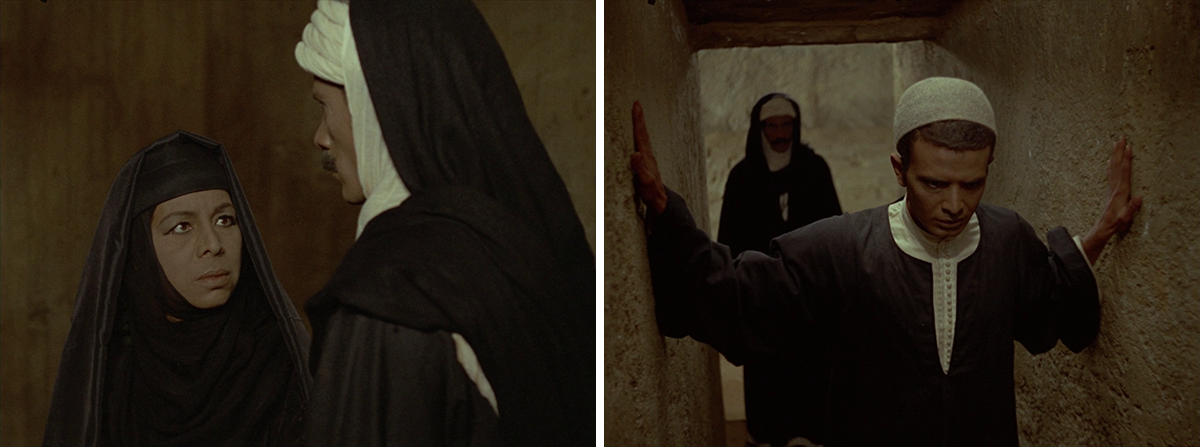
Scene VI
The Selim Family House
Interior. Day.
The house consists of a narrow passage joining the exterior ground l,evel to a hall illuminated by a skylight and built on the remains of what was once a Pharaonic tomb – the remains can still be seen here and there.
Voice of Wanys (continuing, now in his mind): What is to be of me?
From the passage, Brother is seen moving alone into the hall. He disappears in the doorway.
Brother (addressing someone): What is this trust that is a guilt to know and a guilt to be ignorant of?
Wanys moves down the passage, looking before him thoughtfully, and listens. His outstretched arms rest on the passage walls.
In the hall, Brother halts before the majestically seated Uncle dressed in a black and white robe. Relative is standing beside Uncle. The mother, a serene lady in black, sits silently apart looking absently before her: alone in her world of grief. Uncle and Relative calmly observe Brother, who seems tense and restless.
Relative (amazed): Guilt? What guilt cousin? I don't understand your kind of talk.
Brother: And I do not understand your calmness. For years l’ve been carrying objects to Ayyub the dealer. I was told they were found in the mountain. I was told never to question. I believed you! It was our way of life.
Uncle (flatly): It was and it is our way of life.
Brother (nervously): Are you not wise enough to see? Or is none so disturbed as to speak?
Uncle (explaining): You know the secret trust. Your father’s share is yours and your brother’s.
Brother moves away impatiently.
Uncle ( doubtfully): Is it sharing it with your brother that disturbs you?
Brother turns round to them angrily.
Brother (bitterly sarcastic): Sharing the dead?
Mother slowly looks up at Brother searchingly, doubtful of the meaning of his words. Uncle looks fixedly and thoughtfully at him. He is disturbed by Brother's last sentence. Relative, astonished, follows Brother's movement away.
Relative (mockingly): Those you call “the Dead” are but ashes or wood thousands of years old. No one can recall their parents or their children.
The last words echo in the hall. Uncle glances aside to Relative. The latter stops confused. The atmosphere is tense. Brother approaches and stands gacing them, silently. Uncle ignores Brother’s look and, to divert the mood of the moment, addresses Mother.
Uncle (ceremoniously solemn): Generous lady of the house! We are honored by your presence. We are gathered here in your house, the house of our deceased brother Selim, to share your grief and to offer your house our humble and faithful obedience.
Mother (casually ceremonious): This welcome gathering honors our house.
Wanys looks up expectantly towards the hall.
Voice of Uncle (with deep concern and sorrow): May the Merciful grant you the strength to bear your grief. (To the Brother) Yes young cousin? What burns inside you? What ...
The alarmed words die away. On the ground at Uncle's feet lies the golden Pectoral with the eye. Uncle and Relative look, amazed, from the Golden Eye to Brother kneeling beside it.
Uncle (sternly): Why was that object not delivered to Ayyub the dealer? The whole tribe is waiting for its price. If your father were alive ...
Brother looks up fixedly at Uncle.
Brother (firmly cutting in): Leave the dead in peace!
Relative (nervously carried away): You mean leave them to the Effendys?
Relative moves impatiently towards Brother.
Relative: What deal can you make with these arrogant Effendys from Cairo? They would put you in chains if they found this thing upon you. They grab what they want. They don’t pay us like Ayyub.
Brother is still kneeling.
Brother (restraining himself): To you it is an object of gold. To me it is an eye watching me.
Relative (impatiently waving): A dead eye! With enough gold to feed a hundred living mouths.
Brother (sharply cutting in): A hundred mouths that would feed on you if they hunger!
Relative (bitterly): And what fed you all your life?
Brother springs up from the ground and stands facing them with hostility. Uncle looks fixedly towards him.
Uncle (with bitter regret): I have lived to hear the heir of Selim speak in the Effendys’ tongue.
Relative moves restlessly from Brother to Uncle.
Uncle (with clear authority): Know then that coming out of the Pharaoh’s cave has made you a different man.
In the passage, Wanys, alert, is listening as if being sentenced.
Voice of Uncle: Different from the villagers and different from the Effendys, for they envy your knowledge. Know also that the knowledge of this “trust” to a Selim of the Mountain is above his life.
In the hall, Uncle is still looking fixedly at Brother.
Uncle: My dead brother made you for this day. But I find you trembling before me like a child. Our way of life is a hard struggle. But you seem too weak or unprepared for it.
Brother looks at Uncle with contempt.
Brother (with finality): What you call our way of life disgusts me! It is a way fit for jackals.
Brother grabs the golden Eye from the ground and holds it before his uncle’s face.
Brother: Carry your guilt alone.
Uncle, stricken, majestically rises.
Uncle (scornfully): It was your father’s and your father’s father before you. It was by his wish that you know the secret “trust” and it would have been his wish, at this moment, to deny your life.
Sound of a metal object falling to the ground. Uncle looks down at it. The Golden Eye stares up at them from the ground. Brother draws back his empty hand. He rises, looking challengingly at Uncle.
Brother: I do not fear you.
He moves away past Uncle and Relative.
Brother: Better fear the day when your children will ask you: Is this our bread?
He turns round to Uncle and Relative, who ignore him.
Uncle (scornfully): We shall bring them up to respect the traditions of their fathers.
Mother (commandingly): Peace cousins!
She looks sharply at Uncle.
Mother: I am responsible for my sons’ upbringing. They were brought up proud and unbending, like the mountain.
Relative: And we shall not be humiliated in our brother’s house. It is still his house, we hope.
Brother (cuts him off): Only the walls.
Mother looks sharply at her son.
Mother (firmly): The walls and what they shelter.
Voice of Uncle (with quiet authority): Pick up this object. Such things should not fall into the wrong hands.
Relative bends down, picks up the Golden Eye white glancing at Brother with hostility. He rises up beside Uncle, who slightly nods to Mother.
Uncle: With your permission, lady of the house, we take leave. May the Merciful grant you courage to face the hidden.
Mother coldly nods back. Uncle nervously turns round while gathering his dark cape, and walks away, followed by Relative. On their way to the doorway, they pass Brother but ignore him; he ignores them too. Visible through the doorway, the tribe and relatives, seated in the courtyard, rise up anxiously to meet them, exchange a few words with them, then turn and leave disappointed. The uncle looks back for a last glimpse, then thoughtfully walks away.
Brother moves thoughtfully past Mother, glancing at her. She is looking absently at the ground before her. After a while:
Voice of Mother (without looking up): Where is Wanys?
Brother: You only stood up for us when they mentioned my upbringing.
Mother rises gradually from her seat, weak and worn out with grief She doesn't wish to resume the argument.
Mother: Yes. They had transgressed the respect due to this house. Fetch me your brother.
Suddenly a thought crosses her mind.
Mother: Have you seen him since ...?
Brother (cutting in): Yes.
Mother: Have you been talking to him?
Wanys moves slowly down the passage.
Voice of Mother (almost to herself): You talked to him.
Wanys stops, confused.
Voice of Brother (echoing nervously): What is to be of us? Fora mind assailed cannot be silent.
Wanys descends fast, worried and anxious.
Voice of Brother (carried away): Tell me! Countwith me! Howmany bodies did my father's hands violate to feed us?
Mother (violently cutting him off): Enough! What is it you want?
Brother steps forward suddenly.
Brother (equally violent): The truth, now!
Mother: That, you shall know someday or never! The only truth I know is that you have dishonored your father's memory in his house. (Furious) No one shall touch him with a word in his resting place – not even his sons.
She walks away.
Mother (continuing with a voice strained with grief): He was the companion of my days! (She turns to Brother) Truth? Cursed is your truth!
She walks up to him and stands looking at him while tormented.
Mother: Curse you for disturbing what has ended – and now it shall never end.
Brother turns away from her look, disturbed yet stubborn. Mother stands in his way.
Mother: Curse you for disturbing the peaceful look between us.
Mother starts to leave the hall. Halfway, she turns round to Brother.
Mother: Drift alone, unfortunate. I cannot name you.
She leaves the hall through a dark doorway and disappears, as if entering a tomb.
Brother, looking searchingly around, notices Wanys, who is ascending the passage's stairs dazed, leaning against the passage walls.
Brother (from below, his voice echoing): Wanys . . . Wanys ...
But Wanys continues his ascent.
Brother (annoyed): Why are you always apart?
Wanys stops, but doesn't look back.
Wanys (sternly): Why did you have to hurt her?
Brother (still carried away): She lives in her past. Always ...
Brother looks up questioningly. Wanys continues ascending, slightly faster. Sound of his hands moving along the wall's surface.
Wanys: You have shown me a dark fate. A desert in which I must move alone afraid to feel, afraid to remember.
Brother (sarcastically): Remember? Memory only weakens will.
Wanys stops, turning to Brother.
Wanys (equally sharp): The will to what? To forget what was yesterday a truth to me?
Brother suddenly advances, astonished and confused at Wanys' words. He grips Wanys firmly.
Brother (trying to reason): Look at me Wanys! Let us start elsewhere. It's doomed here.
Wanys (in agony): Why did you have to show me all this? Why did it have to be you, my brother?
Wanys stands breathing hard, looking with contempt at his brother.
Brother (fiercely): Listen!
Wanys frees himself of his brother's grip.
Wanys (equallyfierce): I don't want to listen to you. No more!
Wanys quickly ascends the remaining steps to the exterior.
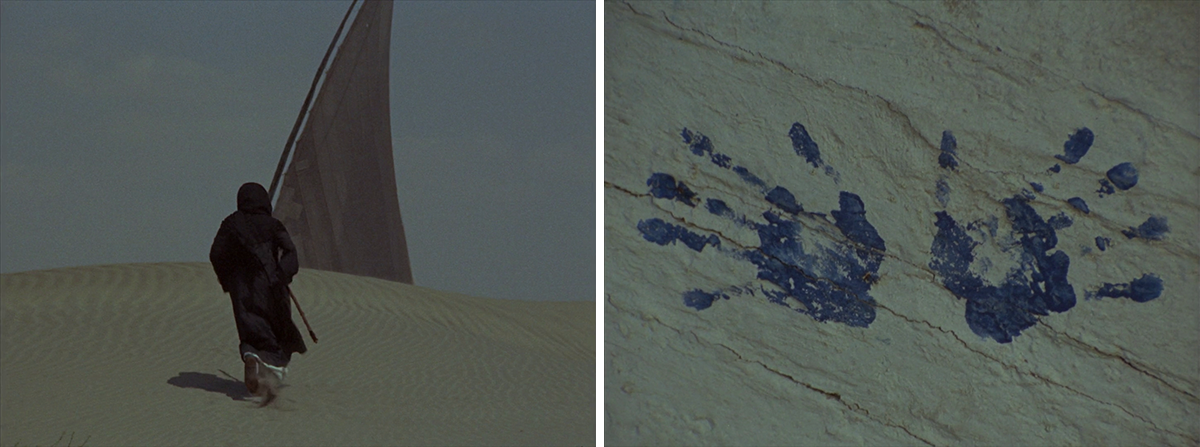
Scene VII
Murder of the Brother
Exterior. Day.
The River Bank. A huge white sail flaps violently. Brother walks decidedly towards it. He disappears from view as he descends the steep river bank. A print of two hands in the form of a butterfly is visible on the bow of the boat. Brother sits thoughtfully with bowed head on the moving boat. An unidentified, masked figure is standing still on shore close by a huge granite boulder. Brother looks up doubtfully towards the figure on shore, who gestures almost imperceptibly. Two masked men rise up in the boat. Brother looks uneasily toward the shore, then suddenly backwards towards the two masked men. He springs up in anxiety. But a hand grips his mouth. A glittering dagger stabs. A hand twists round in pain. Brother’s body is carried away and thrown into the river. A splash. Brother's body sinks. The water’s surface calms and returns to its natural flow. Suddenly, a strange hollow sound.
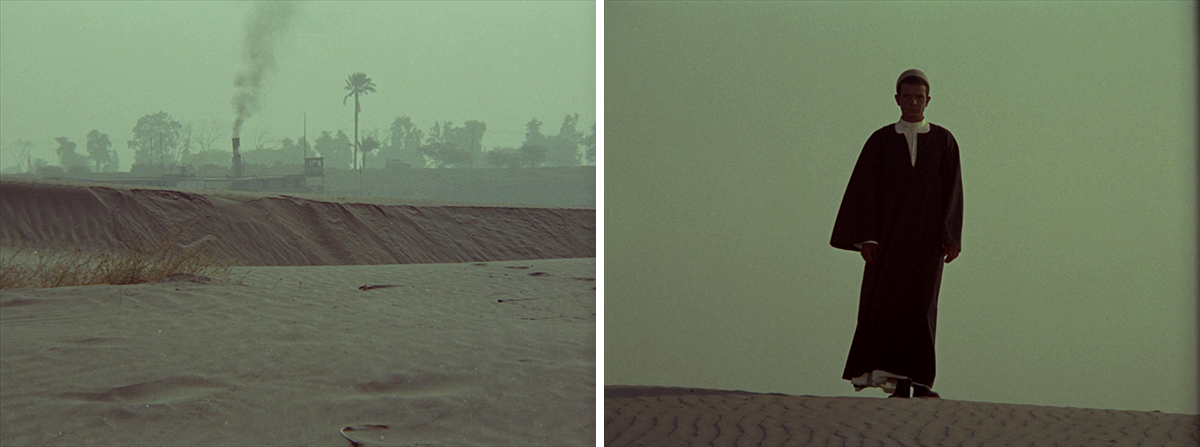
Scene VIII
The Arrival of the River-Steamer El-Mancheya
Exterior. Late afternoon.
Wanys sits at the foot of a colossus of Ramesses at the Ramesseum,9 resting his head on his knees. Steamer's whistle faintly heard. He springs up, looking in the direction of the sound. The ruins of Medinet Habu10 (or any ruin) from south east corner. He walks toward the river.
On the river's horizon, a steamer is approaching. Uncle, Relative, and other members of the tribe stand silent on top of a mound north of the Ramesseum, looking towards the distant plain.
Uncle: What makes them return before their time?
The masked man approaches hurriedly. He climbs the hill and stands facing Uncle. Uncle looks fixedly at him. Gradually Uncle's look weakens. He turns away to suppress his tears. He takes one step and halts, eyes downcast, before Relative.
Relative: We must search for Wanys. He is the only one who knows the secret.
Uncle: No. Let him cry his childhood away. He will return when hunger and solitude weary him.
Uncle (to the masked man): Guard Wanys from a distance, like a shadow. Let no harm reach him.
The masked man rrwves away.
Uncle (nervously): Find me Ayyub's man ... (he can't remember his name) the pale man ...
Relative: Murad?
Uncle: Yes. (Bitterly) His face is still unknown to the mountain guards.
Uncle moves away, descending behind the hill as Relative signals to Wanys' three cousins.
Relative: Find Wanys.
The three cousins move on, descending towards the valley.
Sound of the steamer.
A man, Murad, in a double-breasted weird overcoat and provincial robe, walks hurriedly along a deserted track amidst the ancient ruins. He is followed by two girls.
Voice of a Cousin (calling): Murad!
He stops and turns around. The two girls walk on, past him, and stop a few yards ahead, without turning around. The three cousins walk hurriedly towards Murad. He politely nods to each cousin in turn. They talk, then Murad lifts both hands in protest.
Murad (alarmed): God forbid it; no more! Why, am I a fooi to continue in Ayyub's trade? And now! (Sound of steamer's whistle) Listen! Don't you hear the iron boat's whistle? (Nervously) Well, the Effendys are back again sooner than we expected. And El Badawy bey and his guards, are they not crossing every path? Tell that to your uncle.
He walks away. A cousin follows him. Murad turns to him.
Murad: To survive in this place now needs a shrewd man, a real shrewd man.
A Cousin (disdainfully): You are a coward.
Murad (affirming nervously): Yes master, I am a coward.
He turns round again and resumes his way.
A Cousin: Then why don’t you leave this place?
Murad halts and turns to the three cousins.
Murad (astonished): Why should I? Zyna, my lady, shall open a small shop near the harbor to serve the Effendys. I shall help her with my cousin. (Looking tenderly at the girls) Such faithful girls.
Murad goes alone toward the two girls, who turn bashfully round when he reaches them, then cover their faces at Murad's stern look. They move silently on towards the valley, disappearing behind a dune. The three cousins, fascinated, follow the girls with wide-open eyes. They then head toward Murad.
A Cousin: Since when did they arrive? You never mentioned them before.
Murad (in self-pity): And since when was anybody interested in poor Murad?
Murad turns and walks on followed by the three cousins.
Murad: Everybody is interested in Ayyub. And where is Ayyub at this moment? (Sarcastically) in Caïro? in Suez? or in any place he likes. And when he arrives ...
Murad turns backwards toward them as he walks.
Murad: We all run to serve him. (Calling the girls) Wait young cousins. (To the three men, complaining) They are so anxious to see the Effendys from Caïro. Forgive me, one shouldn't leave them unprotected.
Murad runs to join the two girls. The three cousins follow eagerly. They then suddenly look aside and halt, observing: Wanys, alone before the palms at Mit Rahina, is looking fixedly at the steamer. Murad steps quietly beside him. Wanys glances at him then looks back towards the steamer.
Murad (sighs): More Effendys from Caïro! A floating city of them.
Murad passes Wanys and halts, observing the steamer. Wanys observes Murad 's back for a second then looks again towards the steamer.
Murad: The wealthy strangers! Wealthy indeed! (Regretfully) Strange days are coming.
Wanys looks toward the girls, who cross the three cousins.
Murad: And your kind father left you with a heavy trust.
Murad looks sadly back to Wanys, then lowers his eyes.
Murad: May he rest in peace. Wanys looks fixedly at Murad.
Wanys (coldly): What is it you wish Murad?
Murad delighted to start any conversation.
Murad: May you prosper ... only your safety.
Murad moves closer to Wanys, pointing towards the river.
Murad: They are shrewd and powerful. (Confidentially) How will you deal with them now?
Wanys steps back, stricken. Murad comes closer.
Murad: I mean, one must choose well these days!
Wanys (sternly): Is this a message from Ayyub?
Murad, startled by this question, stands confused.
Murad (stammering): Ayyub? What Ayyub?
Wanys: Your master.
Murad (slyly and meaningfully): My master is gold and its glitter. Master? Look!
The Steamer. Ahmed Kamal rises before it up the river bank followed by his assistants who, in their modern clothes, look like people from another world. El-Badawy and his guards ride at full gallop toward them. An omda (local mayor) and about sixteen attendants walk hurriedly towards the steamer. The omda and his attendants salute Ahmed Kamal.
The Girls (calling): Murad! Murad!
Murad turns to Wanys apologetically.
Murad: My cousins are very curious to see Effendies from Caïro.
The two girls turn excitedly from Wanys to the crowd.
Murad: (Helplessly): Forgive me master Wanys. But l'll try to know why they came and tell you later. Honor me with your visit, master. (Saluting as he retreats) I am your servant.
Wanys looks from Murad to the Effendies in silent anger.
El-Badawy Bey dismounts and salutes Ahmed Kamal, who then resumes his way towards his waiting carriage. Noticing Wanys, he slows his pace, halts, then approaches him, his look friendly but curious. When he passes Wanys, the latter turns round, following him with his eyes. Ahmed Kamal continues looking towards Wanys, thoughtfully, as he rises to his carriage. An assistant who is already in the carriage observes Wanys, too.
Assistant: What a curious look!
Ahmed Kamal: One would think it is that of a stone image come to life.
Wanys stands looking nowhere, like a statue.
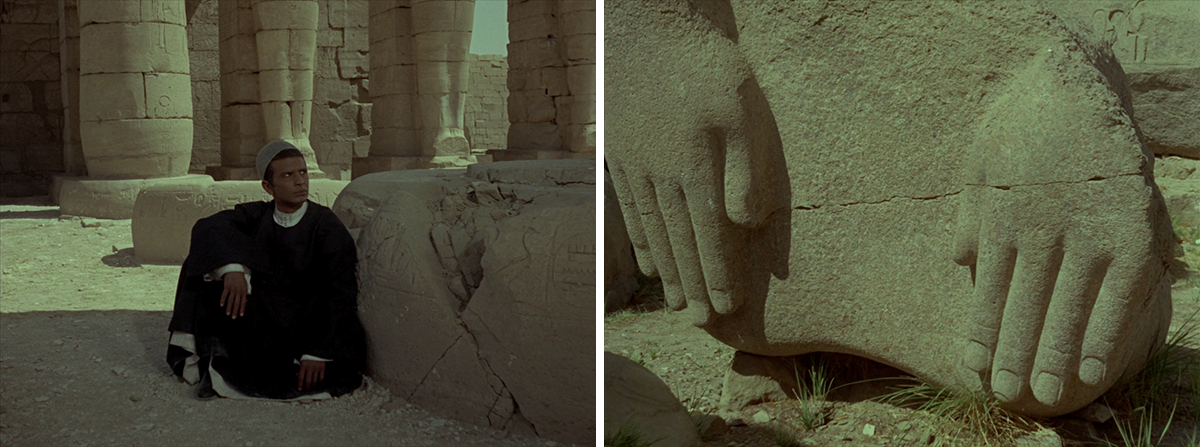
Scene IX
The Stranger
Two faceless Osiris statues, Ramesseum Temple, Luxor. A youth stands staring up at them, then turns around looking up in wonder. Suddenly, he notices Wanys seated in the shade of a column. Wanys looks back over his shoulder. The stranger halts, rather uncertain.
Stranger: They are all faceless!
Wanys (vaguely): Yes.
He slowly turns and looks fixedly at something before him.
Wanys (thoughtfully): But yonder is a face as large as a man.
The stranger approaches, looking in the same direction. The face of a huge Pharaonic statue lies on the ground. The stranger observes it, then turns round to Wanys in wonder. Wanys, still in the same attitude, looks from statue to stranger, then, casting aside his melancholie mood, rises and approaches the stranger.
Wanys: Are you a stranger to the mountain?
Stranger (still observing the head): Yes.
Wanys: Do you not have similar ones in your village?
Stranger (amused): No. Did they scare you ever?
Wanys steals a glance at the head.
Wanys (turning away): They were our playmates once. (Alone) I used to hide among them with my brother.
Two huge granite hands rest in the grass. Wanys turns round to the stranger while touching the gigantic shoulder of a nearuy fallen Colossus. The stranger joins him. They disappear among the fragments of the fallen colossus. The stranger looks above and around him in awe. He sees another colossus' fist.
Stranger: A hand holding a fate no one can read.
Wanys turns round amused, looking from the stranger to the fist.
Wanys: What fate can you read in a hand of stone?
Stranger passes Wanys toward a carved way.
Stranger (pointing around): The fate of all those castles and those images ...
Stranger moves on looking up at the carved wall.
Stranger: Men going to nowhere ...
Stranger disappears behind a huge column.
Voice of Stranger: And ships sailing to nowhere. And columns holding no roof.
Wanys halts and looks up at the huge columns.
Vast landscape of ruins. Wanys and the stranger – two mere dots – wander amidst the ruins, each with his troubled thoughts. They are being spied on by the three cousins.
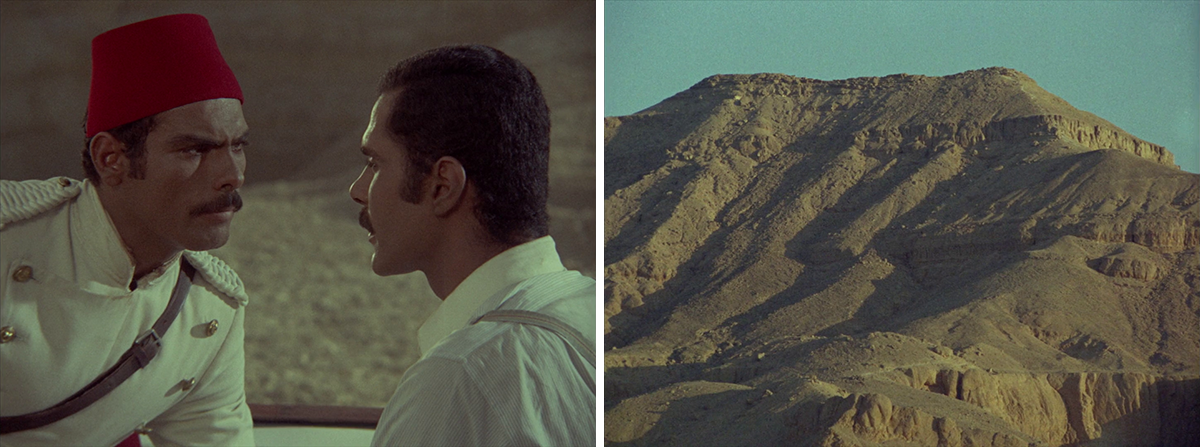
Scene X
The Closed District
Wanys and the stranger are walking silently. Stranger notices something and halts. Wanys looks at it too. He slows down and stops like one giving up. Stranger advances a few more steps towards the Closed District at the foot of the mountain: a barbed-wire fence enclosure with a gate ... the archaeological society ... men hard at work in the glaring sun ... big wooden boxes and equipment. Further on, the ruins of Deir el-Bahri. A number of young male villagers are assembled in a line. A local assistant is giving their names to a nearby Effendy. He notices Wanys and the stranger.
Assissant (callingfrom a distance): You there! (No answer) The gracious Effendys need more hands.
Stranger looks at Wanys, excited by the idea.
Stranger: Let's follow. It is honest pay.
Stranger moves towards Wanys.
Voice of Assistant: Approach!
Wanys doesn't move.
Stranger (encouragingly): Come.
Wanys (hesitantly): I have other things to do.
Wanys starts to turn. The stranger looks apologetically at him.
Stranger: Forgive me then for leaving you. But I am a stranger here, and I need to work to settle here.
Voice of Assistant: Approach!
Wanys looks understandingly at the stranger.
Wanys: We will meet at the day's end, at the harbor.
Stranger: Farewell brother.
Stranger turns and runs towards the gate.
The cliffs of the mountain at Thebes. Ahmed Kamal sits in deep thought observing an enlarged Description de L'Egypte map of the topographical sites of the Valley of the Kings. After a moment, he looks up towards the mountain. El-Badawy walks in.
Ahmed Kamal (absently, his eyes following the mountain outline): All seems so vague and silent.
El-Badawy moves back and forth, tapping his whip nervously.
El-Badawy: The missing tombs of a whole dynasty! That which you say is hard to conceive. l've been through every path in this mountain. They are all deserted! (Bitterly) Yet, there must be a damned link between these missing tombs and this wandering dealer. For that link I would evacuate the whole district, and all those who approach will be arrested.
Ahmed Kamal turns round towards El-Badawy.
Ahmed Kamal: We would then lose that link which today exists and which will guide us to the lost tombs.
El-Badawy: You don't know the challenge of these mountain people. I don't trust them. They mock me and the law. They make us feel like outsiders. Why should they give in now?
Ahmed Kamal: They will give in. We are both conscious of each other's power. I can wait for long. I won't starve. They can't wait for long. lt is in my power only. (Almost to himself as he rechecks the map) Somewhere in this mountain lie the lost Pharaohs of the XXlst Dynasty.
El-Badawy (pointing with his whip to the map): I've checked these and every track leading to the Valley of the Kings.
Ahmed Kamal and El-Badawy take a few steps in the direction of the mountain.
Ahmed Kamal: I doubt if these tombs are in the Valley of the Kings, for it contains the tombs of the 18th, 19th, and 20th Dynasties only, and these were plundered 3000 years ago, at the fall of the empire.
El-Badawy (nodding): These were the mightiest Pharaohs. What fate befell them, I wonder! Ahmos, the liberator of the Nile valley, and his son Amenhotep, and all those who followed. I pass by their tombs daily: they are dark and empty, like holes in the mountainside.
Ahmed Kamal: Like wounds in the mountainside! And there, all along the ridge of the desert, lie the ruins of what was once their mortuary temples. A temple to every Pharaoh!
Ahmed Kamal looks towards the distant temple of Rameses II (Ramesseum).
Ahmed Kamal: Thotmus III, who carved out the first empire in history. And, Seti I, father of Rameses II whose legendary name passed on to a whole Dynasty of Pharaohs.
Ahmed Kamal sits before the wooden board again.
Ahmed Kamal (continuing): There lie his temple. And yonder, that of his grandson Ramses III ...
Sound of wailing.
Ahmed Kamal (turns towards the sound): What is this sound?
The dwellings of Qurna and the mountain as seen from Medinet Habu. Women in black are going up to the main house.
El-Badawy (without turning): The mourners of that mountain tribe. Their chief died yesterday and was buried at the foot of the mountain.
Ahmed Kamal (interested and thoughtful): Tell me more about that tribe.
El-Badawy looks fixedly at the dwellings as he paces.
El-Badawy: Kind of herdsmen who can trace their lineage back five centuries: the powerful mountain tribe of the Horabat. They never leave the mountain or mingle with the people of the valley.
A pause. Ahmed Kamal is in deep thought. El-Badawy approaches then stands still.
El-Badawy (firmly): l've been observing them for quite a time.
Ahmed Kamal glances once more towards the dwellings then a strange feeling gradually creeps into him, the feeling of being watched. He turns round, looking towards the barbed-wire fence. At a distance, behind the fence, as if he was always there, Wanys stands observing the equipment, when suddenly he notices Ahmed Kamal, too. He looks fixedly yet confusedly at him. Ahmed Kamal looks thoughtfully at Wanys. El-Badawy approaches, following Ahmed Kamal's look. He looks nervously from Wanys to Ahmed Kamal.
El-Badawy (sharply): Do you know him?
Ahmed Kamal (almost to himself): No.
El-Badawy (calling): You, there!
Ahmed Kamal firmly holds him back, annoyed and alarmed.
Ahmed Kamal: Silence!
They turn toward Wanys again: the barbed-wire fence – Wanys has disappeared.
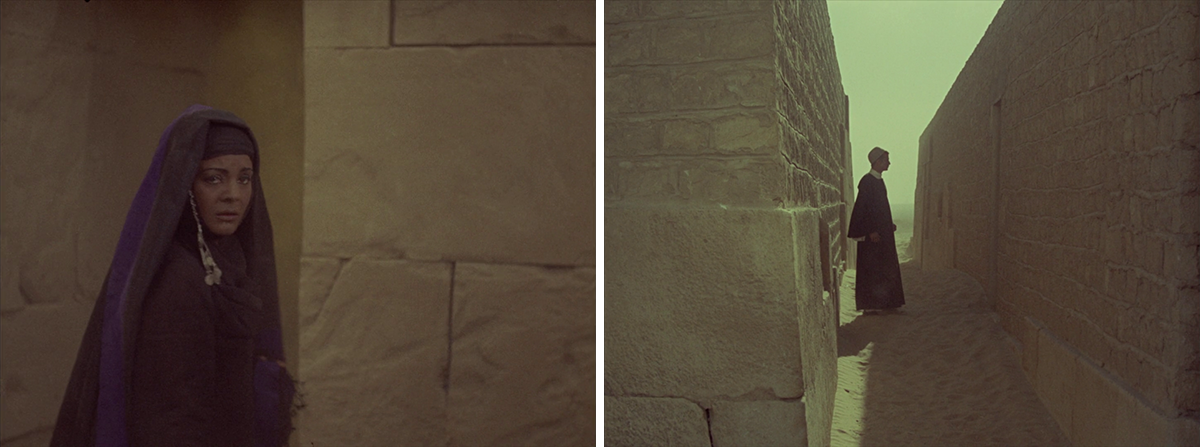
Scene XI
Zyna
Wanys is moving swiftly. He then turns round and halts, looking towards the closed district. Suddenly he hears light footsteps. He turns round sharply but then relaxes and stands amazed: Zyna stands against the ruins of a huge stone, watching him timidly. She moves slowly away and disappears behind mastabas.11 Wanys follows her rather eagerly and disappears in turn. He sees her and moves faster towards her. He goes to where she stood and looks around: vast area of ruins. He searches eagerly for her through the paths of mastabas. Zyna appears behind a mastaba, but only for a second. She disappears again. He sees somethingin the distance and runs toward it: Zyna at a doorway. She enters, looking right and left, dust blowing through the room. He reaches the doorway, but halts motionless, looking toward the interior.
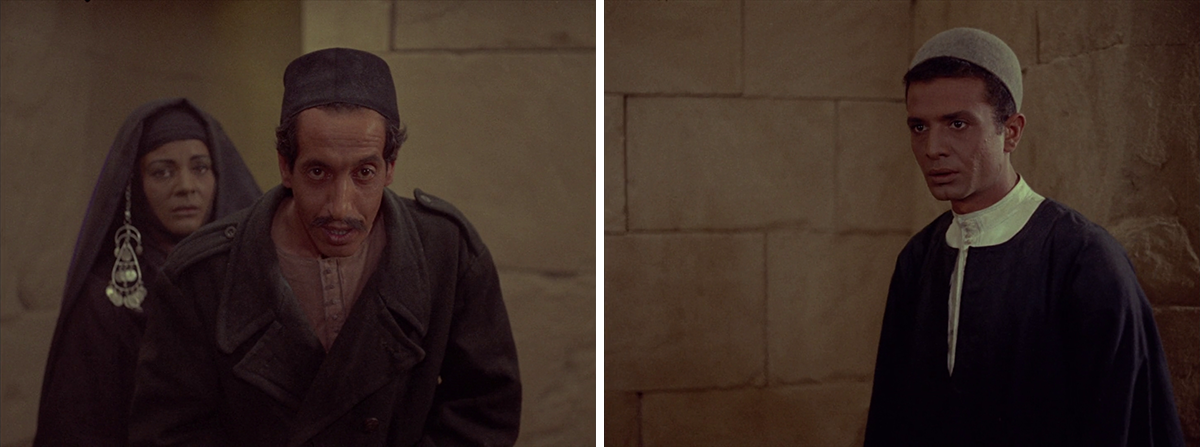
Scene XII
Murad’s Hiding Place
Interior: Day.
Murad bows in the doorway, revealing Zyna irritated and confused.
Murad (apologizing): Master Wanys, do come in from that dusty wind. (He steps back) No one should see us together: neither the Effendies nor others.
Wanys looks down at Murad, who is still bowing, then towards Zyna. Murad leads the way to the corridor.
Murad: Have you come to know the reason why they came? It seems that a piece of papyrus fell in the hands of the chief Effendy. (Shaking his head regretfully) This Ayyub is getting old and careless (sighs).
Wanys (cunningly yet uncertain): Have you talked to him?
Murad: Who?
Wanys: The chief Effendy.
Murad (casually): Yes ... and no.
Wanys moves forward slowly past Murad.
Wanys (after a while): Then how did you know?
Murad (honestly): From his assistants ... and they are shrewd men. (In a casual tone) They say it comes from a tomb.
Wanys halts uncomfortably. Silence. Murad passes Wanys.
Murad: But that, you know better of course! The mountain is yours. (Suddenly turning back to Wanys) Forgive me master Wanys! Talking about the Effendies has made me forget the rules of hospitality. Honour me within! (As if remembering) Some persons dear to your heart, and you to them, will rejoice at your sight.
Murad waits respectfully for Wanys to pass. Wanys enters the main chamber.
Voice of Cousin (cheerfully): Our leader!
Wanys, not expecting his cousins, looks aside suddenly.
Cousins I and Il (casually): Don't fill your thoughts with the Ef-fendies like the old ones of our tribe.
Cousin turns to his harp.
Wanys (flatly): They don't trouble me.
He moves restlessly around.
Voice of Cousin Il (smiling): A good sign for a leader.
Voice of Cousin I (ironically): Yet is it a sign of wisdom to trust a stranger?
Wanys halts, and looks fixedly at cousin.
Wanys: He is but a passing stranger.
Cousin I: Working for the Effendies, who are also passing strangers.
Cousin II: How many more strangers will come to our mountain and gorge themselves, son of Selim?
Wanys turns away annoyed yet confused.
Wanys (coldly): I do not need your words to remember who I am.
Voice of Cousin II (sincerely): Forget your grief Wanys. Yesterday will never be again.
Wanys sees something and turns toward it astonished: a man's naked back, vaguely seen through the crack, passes and disappears. Wanys stands stunned for a moment, then goes towards the crack. He halts when he sees Murad's girl stepping out of the crack, excited and unveiled, holding something in her hand.
The Girl (softly): Murad! Murad!
She sees Wanys, stops confused, covers herself and steps back into the dark crack, her arm outstretched, holding a statuette in the form of a mummified body. Murad dashes past Wanys towards her, grabs the statuette and turns round, facing Wanys in terror.
Wanys (furiously): What deal is this?
The two cousins step between him and Murad.
Murad (stammering): I'll get her, master Wanys. Anything to please you.
Murad sneaks away from behind the cousins and disappears through a doorway. The third cousin steps out of the crack, finishing dressing.
Cousin III (in admiration): Well! What a fine dealer you are cousin! He wouldn't give us the pretty one.
Wanys (carried away): What kind of deal is this? And for what?
The girl appears. She veils her face.
The Girl (her pride offended): For what? Why, am I not better than a stone?
Wanys (violently cutting in): Silence woman! Be gone!
Voice of Murad (calling tenderly): Come my treasure. The honorable men mean business.
The girl walks away, hurt. Cousins stand amazed, yet still in good humor.
Sound of the wind rising outside.
Cousin I (curiously): What's come over you Wanys?
Cousin Il: We shall deal with Murad. He gives us what we want.
Wanys stands confused and enraged.
Voice of Cousin III (affirming): Certainly! Certainly!
Wanys (clearly): Everything found in the mountain must be shared by all the tribe.
Cousin I: We will share it with you.
Wanys (repeating firmly): Everything found in the mountain must be shared by all the tribe.
Cousin II (equally firm): Can you tell that to the Effendies? You are now our leader.
Wanys looks at cousin Il with fury. Cousin I takes a step toward Wanys.
Cousin I: Why should we share it with the Old Ones of the tribe? We lose half the profit. The mountain is no longer theirs alone.
Wanys takes a few steps away then turns sharply round to them.
Wanys (alarmed and enraged): By God! By what accursed name could I name you?
Cousin II (directly): Your blood-cousins and life-companions.
Wanys (violently carried away): A company of scorpions! Jackals feeding on those who have sheltered you! T
hey step closer, challenging.
Cousin II (offended and hostile): How could you address us so in a stranger's house?
Wanys goes towards them.
Wanys: As if shame could know your faces!
The third cousin steps quickly between them and with outstretched hands pushes back the two cousins.
Cousin III: Enough! We are still cousins.
Wanys: No more!
Wanys, enraged, turns and is about to leave the room when Murad approaches hurriedly from the opposite side and pushes the statuette into his hand. Wanys raises it slowly before his face.
Murad: Hate Ayyub. Don't hate your cousins. It is he who cheated your tribe. I know that well. I've worked for him. (Calling gently) Return, master Wanys. The weather is evil outside.
Zyna halts confused in the passage end through which Wanys was about to leave.
Voice of Murad: Come my jewel. Do not be afraid.
Zyna approaches, going to Murad. Wanys stands like one being tortured, but doesn't turn round or move. Zyna halts when Wanys stretches his arm to the wall.
Voice of Murad: I can give more than Ayyub.
Wanys lowers his arm. Zyna moves past him.
Voice of Murad (desperately): He is coming today to take the Golden Eye.
Murad steps behind Wanys.
Murad: Why can't I have it? I am always here with you, serving you.
Wanys (disgusted): A service too mean for me to utter.
Murad (in misery): Maybe. But it is Ayyub who taught it to me. This is how Ayyub started here.
Wanys stiffens, pushes Murad in the face. Murad falls in cousins’ hands.
Wanys: Don't ever cross my path Murad! Let none of you ever cross mypath!
Cousin II: We will meet.
Wanys: Never!
Wanys walks out of the room.
Cousin II: We the Horabat know but one path and that is up to the mountain.
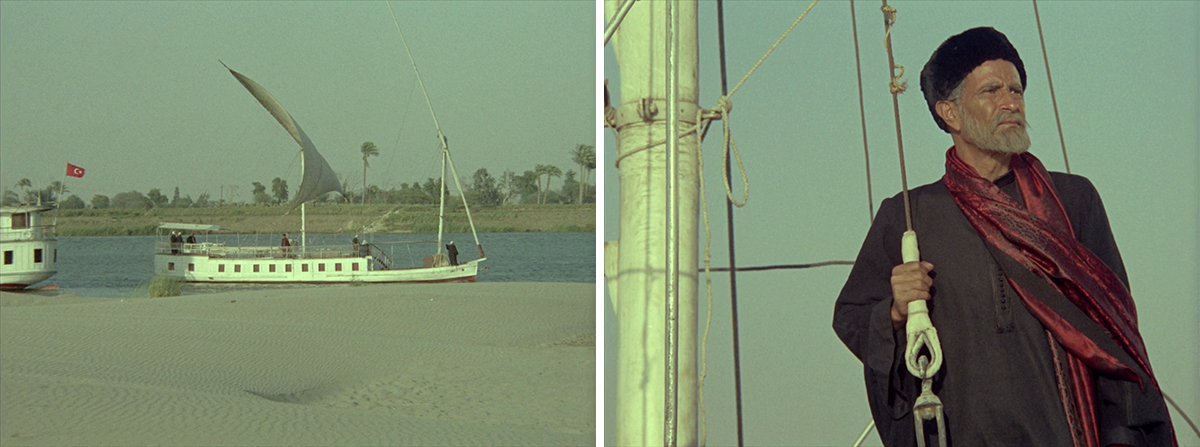
Scene XIII
The Storm
Exterior, day.
Stranger, alone, approaching in the storm. Men appear before and behind him, close upon him with sticks. Stranger appears and disappears amidst their bodies. Sounds of sticks beating. Stranger's cry. Stranger falls on the ground through their bodies.
The river-steamer stands motionless, powerful in its silence. A sailboat snakes from behind it, and passes on. On the sailboat, Ayyub, an elderly man in a strange outfit – a mixture of local and European dress – stands in silent hatred observing theriver-steamer. The sailboat approaches the deserted shore.
Two Messengers on the Shore (in terror): Leave, Ayyub. The guards are everywhere! Old Selim is dead.
Ayyub is disturbed by the news, but stands firm, almost indifferent.
One of Ayyub’s Sailors (sad and worried): We have to leave, Ayyub. There is no bread for us here.
A pause.
Ayyub (seif-assured and calm): Another Selim will come. This is the appointed day of the month. (Thoughtfully) Another Selim will come.
He stands looking towards the empty desert. Gradually the dark figure of a man appears, risingfrom behind a bush. Ayyub's sailors push a small boat toward the sailboat. Ayyub sits down in the small boat. The porters, standing in the water, push the boat. When they reach the shore, they carry Ayyub and lower him there. The dark figure looks around then dashes towards the river, approaching Ayyub in a hurry: it is a masked man. He reaches Ayyub, who looks suspiciously at him.
Masked Man (brief but stern): Pay for this and set sail, Ayyub!
The masked man swiftly looks around and hands him an object: the Golden Eye. Ayyub inspects it, then re-wraps it, contended.
Ayyub: How is old Selim?
Masked Man (distantly): He is dead, and it is not safe for his brother to move with this.
Ayyub: What else?
Masked Man: He tells you it is safer to sell a little at a time now. All is not well with his tribe.
Ayyub gives the masked man a small sack of money. The latter puts the sack in his pocket, then runs back to the sand dune.
Voice of Ayyub: Where are his sons?
Masked Man: Set sail Ayyub! Ask no more! I have said enough.
The masked man turns round and disappears in the storm. Ayyub stands silent for a moment, looking towards the mountain.
Ayyub (shrewdly): Murad hasn't come? (Turns round to his porters) Has he left?
Porters (not daring to look up): No, master.
Ayyub (bitterly nodding): He can deal with any side now. He is an unknown dog.
Suddenly one of his porters comes close hurriedly, looking anxiously towards something approaching. Ayyub swiftly turns round, looking in the same direction. Wanys halts before them, his face strained with bitterness and hatred. Ayyub, finding that it is only Wanys, relaxes a bint, and greets him.
Ayyub (regretfully): Your father's death grieves me as it grieves you! I would have come but it is unsafe, you know.
Wanys doesn't salute him.
Wanys (cutting in): There is no welcome for you. No more!
Ayyub is taken aback.
Ayyub (offended and astonished): Since when is this talk, child? Has the trust you inherited made you that arrogant? With whose tongue do you speak?
Wanys (firmly): My own and my brother's. There shall be no more of this trade!
Ayyub (smiles scornifully): What other trade do you know – when you don't know even this?
Ayyub thrusts the Golden Eye in Wanys’ face. Wanys spontaneously snatches it, taking a step back.
Ayyub (gently): Give it back son!
Wanys: Don't call me Son!
Ayyub: Yes I'll call you Son, for your father was more than a brother to me.
He steps forward.
Wanys (in contempt): Away leech!
Ayyub (annoyed): Give it back! l've paid for it (tries to grab it), as l've paid for the wealth of your wretched mountain-tribe.
Wanys holds it back.
Wanys: You made us wretched.
Voice of Ayyub: You want to deal with Murad?
Ayyub stands still boiling with rage.
Ayyub (shouting to the porters): Take it from him even if it means his life!
Ayyub steps back. Two porters advance towards Wanys. Anotherporter holds his stick behind him.
Voice of Ayyub: There shall be no more trade. Let your men starve and your women carry wood to the market.
One of the porters holds and raises Wanys’ hands, one of which still holds the Golden Eye.
Voice of Ayyub: You have doomed your tribe.
The other porter knocks Wanys with a strong blow on the head with his stick. A second blow. (Fade away to darkness.)
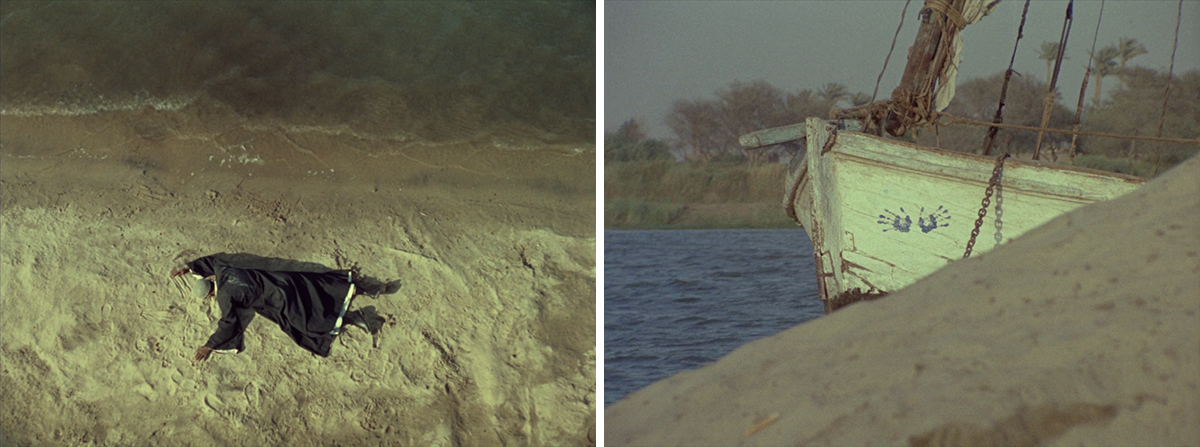
Scene XIV
The Blue Hands, the River Bank
Fade-in
A melancholy purple cast covers the landscape. The storm has ended but a thin veil of dust lingers on. Wanys lies flat on the shore. The sound of a bell repeats. Gradually he lifts his head in pain. He looks at his empty hand, then towards the river. The river flows on peacefully, its purple surface filling the screen. Wanys rises up, wounded and tired, and walks along the shore, thoughtfully, with bowed head. Grief and anger have given way to pride and self-pity. His tears gradually rise, but he suppresses them with difficulty. Sound of a sail flapping violently (the same sound that was heard in the brother's murder scene). Wanys, moved by a curious instinct, approaches and sees from among the boulders the bow of the deserted boat rocking lazily, with two blue hands painted on it in the form of a butterfly. A breath of silver smoke. He follows it to the boulder’s edge and looks down. Two men in dark clothes sit on the sand counting some coins. They notice Wanys and spring up in fright, as if looking at a vision. They dash away, disappearing among the boulders. Wanys, curious and suspicious, follows them, appearing and disappearing through bushes and boulders. But there is no trace of them, only emptiness and void.
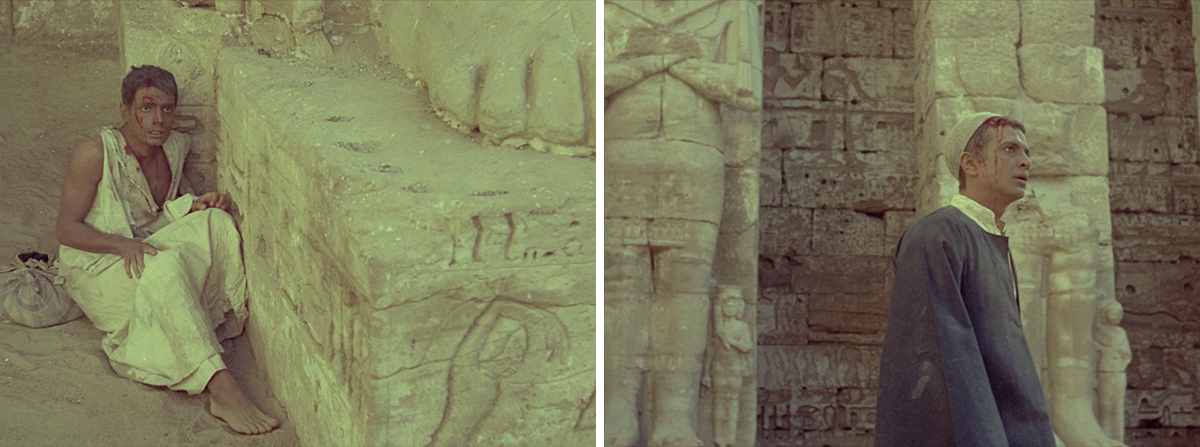
Scene XV
The Stranger (II)
Exterior, late day.
Wanys finds himself once more alone in the ruins of Medinet Habu. Everything seems to withdraw from him. Silence. The stone images look serenely away, far above him, into infinite space. Wanys approaches them. He is an insignificant figure at their feet. The faint moaning of a man in pain becomes audible. Wanys looks eagerly around. A rustling sound among the stones. Wanys turns round: a row of Colossi. A man crawls to hide. Wanys dashes towards him, reaches him, and stops horrified at the gory sight he sees: the passing stranger, wounded and in terror, cuddles up at the foot of a colossus. Wanys stands horror-stricken. The stranger crawls away in terror, hiding behind another colossus.
Wanys (alarmed): Wait! (Stepping towards him) Wait!
Wanys tries to reach him. But the more he tries, the more the stranger moves away. Wanys follows him behind the row of colossi. They stand at a distance, facing each other.
Stranger (beseechingly): Mercy, son of Selim!
Wanys (amazed and in sorrow): Now you know my name!
The stranger nods.
Wanys: Were they three?
Stranger: Doubt me no more: I am leaving. They threatened my life should I stay till nightfall.
Wanys (cutting in desperately): Rest in peace! Tell me what makes those mighty Effendies work all night at the foot of the mountain?
No answer.
Wanys: You 've worked for them.
Stranger moves further away.
Stranger (uncertain and afraid): I don't know. I told them I don't know!
Wanys, finding it impossible to regain the stranger's confidence, kneels down.
Wanys (helpless and tormented): Don't fear me. I am as wounded as you are.
The stranger, seeing Wanys’ desperate situation, halts, hesitating.
Stranger: Leave me to my pain, son of Selim!
Wanys (agonized): Stranger, my pain is all that has been my life – a pain I am too ignorant to understand. Tell me ... (in self pity) for my thoughts have shattered my home and marred its memories. (Bitterly) l stand helpless, enraged before this mountain and its silence, for I have a share in it too ... My father . . . What do they seek in it? What they have is worth all that is in this mountain.
Stranger: They say they seek people upon whose ruins we live today. They call them ancestors, and can read their writings and their names on the stone. They care for them ...
Wanys springs up alarmed, and turns away disturbed.
Wanys (violently cutting in): Enough! They are dead! Dead! No one can recall their parents or their children.
Wanys leans his head against the wall, not daring to look back.
Wanys: Tell me no more! You make the stone images seem alive to me.
He turns round to where the stranger stood, but the latter is nowhere to be seen. Wanys searches for him, around the colossi’s feet – but in vain. He stands lost and alone in the tempte court before a high wall covered with hieroglyphic inscriptions.
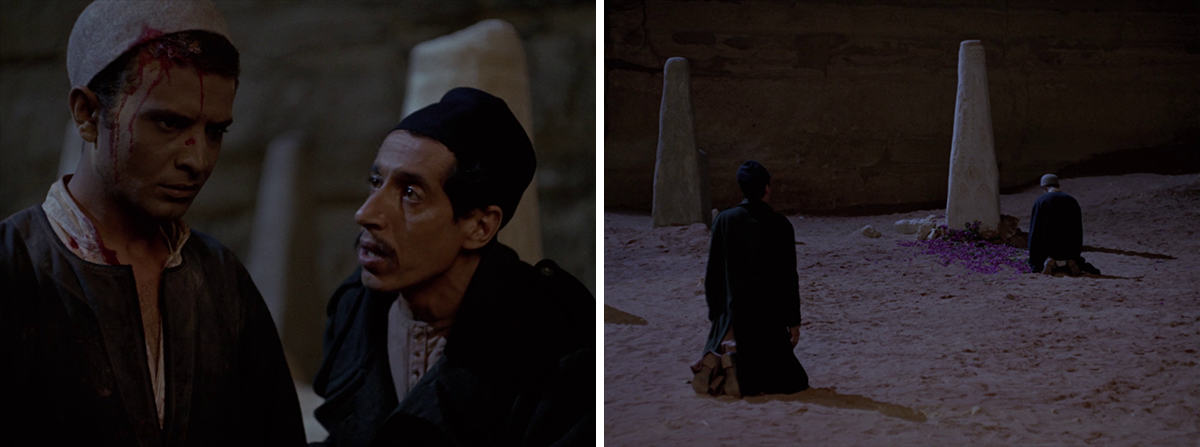
Scene XVI
Before the Father's Grave
Exterior, night. The village graveyard. Wanys kneels down exhausted before his father's grave. Suddenly a dark figure kneels at a distance behind him. It is Murad.
Murad (excitedly, whispering): Master Wanys! Master Wanys!
Wanys springs up from the ground and faces him.
Wanys: Why do you follow me here?
Murad starts lamenting.
Murad: Cursed be the day that made me the bearer of ill tidings. Cursed be the day that they will harm you too.
Wanys (furiously): Who can harm me?
Murad: Cursed be the wretched day I was born . . . (weeps on)
Wanys rushes towards him and pulls him up by his robe.
Wanys: Say what you have to say and be gone!
Murad (helplessly sobbing): Your tribe! Your own blood! (Hysterically) O, beat me! Kill me! I deserve more. O evil day!
Wanys holds him firmly.
Wanys: Speak out Murad! Don't play with words!
Murad: God have mercy on your brother. (He weeps softly) They killed him.
Wanys drags him round by the collar.
Wanys (violently cutting him off): Liar!
He restlessly throws him to the ground.
Wanys (wild with rage): How could you play with such words?
Murad rushes to the tombstone.
Murad (terrified): It's true! I swear by ...
Wanys knocks him away ruthlessly.
Wanys (hysterically aloud): Don't touch him!
Murad falls flat on the ground weeping. Wanys stands trembling with rage.
Murad (lamenting): I am a poor wretch hated by all ...
Wanys pulls him up.
Wanys: Prove your words! Who killed him? Speak!
Murad: The boat he set sail upon bears the sign of two hands in the form of a butterfly. It is anchored outside the harbor, its owners awaiting the price of their evil deed. Wanys gradually lets go of Murad’s collar, remembering everything: the blue hands and the two men in dark clothes counting some coins. Murad falls on the ground. Wanys moves away thoughtfully. Murad crawls behind him.
Murad: Your uncle disappeared all day. They say he is searching for you. He does not trust you. He is not like your father – may he rest in peace.
Wanys stops, deep in thought and pain. Murad stops behind him.
Murad: Wanys, Master Wanys, you and I know what we are talking about. He has sent for Ayyub. He will take everything. Everything. Yes Ayyub will take everything. He shall cheat you and your tribe once more. He has always done so.
Wanys, irritated by this sudden intimacy, pushes him away.
Murad (in self-pity): He brought me here a stranger and left me like a dog. You are young and strong. You can climb the mountain faster than your old uncle and Ayyub. Take me with you! (Nervously) You must decide alone, now. If not, your uncle will take all. And if he does not, the Effendies will take it. And what will be left for us? We are not like the village people. Trust me! I know how and where Ayyub deals with the foreigners. All the gold shall be ours. We will sell it in Cairo.
Wanys stands in deep reverence for a moment, then looks at Murad.
Wanys: Have you seen the dlead, Murad?
Murad (distracted): What?
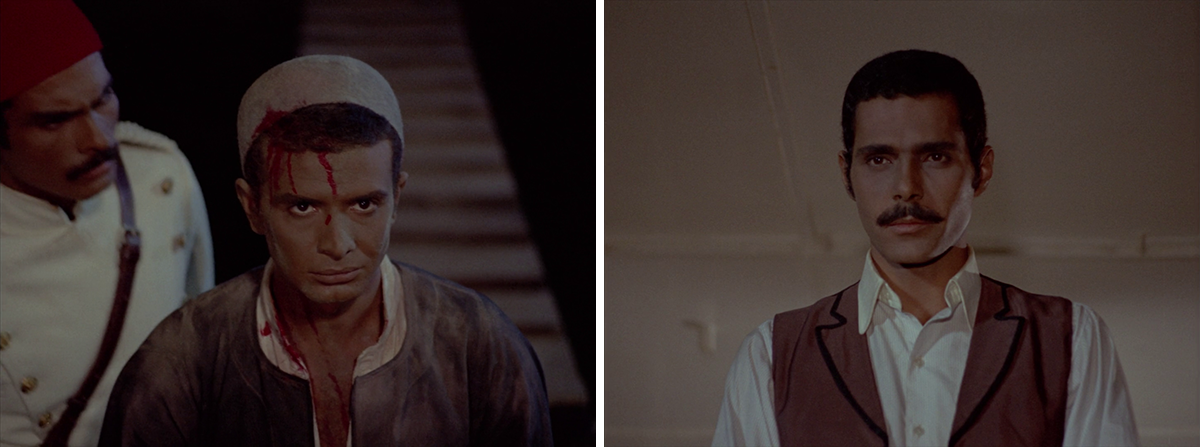
Scene XVII
The River Steamer (II)
Exterior, night.
The river steamer, with its lights on, is visible from the shore. Murad is trying to hold back Wanys, who, disturbed, moves on, dragging Murad behind kim.
Murad (anxiously): Stop master, stop! There must be another way to the mountain! (desperately holding Wanys back) Stop! They are shrewd men.
Wanys rids himself of Murad’s grip and continues towards the steamer. Murad follows, trying to hold back Wanys again.
Wanys (firmly): Away!
Murad: They will pay you nothing. Deal with me the way you wish. l'll be a brother to you.
Fed up, Wanys knocks him away with contempt.
Wanys (enraged): Be gone lowest of the damned!
Murad swiftly returns, this time blocking his way.
Murad (frantically): No! You shall not reach them, son of Selim! You shall not go further! You shall not go further! You shall not reach them!
Wanys grabs him by the neck. They fight ruthlessly, falling to the ground, rolling in a cloud of dust.
Voice of Guards: Who goes there?
Two mounted guards dash, approaching from the river bank. Murad runs away in terror. He is followed by the guards. One of them looks back in Wanys’ direction, halts and returns. Wanys has risen up, exhausted yet resuming his way towards the steamer. The guard reaches him and grabs him. Wanys pulls the guard down from his horseback. A rifle shot. Ahmed Kamal dashes out of his room on the steamer to the railing. El-Badawy dashes beside him, a revolver in his hand.
Ahmed Kamal (to El-Badawy): Halt! Don't shoot!
El-Badawy (repeating aloud): Halt! Don't shoot!
El-Badawy climbs down to the landing raft and stands waiting.
El-Badawy: Who's there?
A Distant Voice (Guard I): A man in rags, Sir.
Ahmed Kamal (calmly): Let him approach!
El-Badawy looks up at Ahmed Kamal, in a questioningly-stern manner, then turns toward the guards.
El-Badawy: Let him approach!
Wanys is vaguely visible as he approaches – a shabby vision: wounded, in rags, walking in the search-light. He stops and raises his hand before his face to shield his eyes.
Ahmed Kamal: Close this light off!
Wanys approaches, with the guard, mounted again, following him, a torch in hand. Wanys continues walking till he stands before the landing raft, facing El-Badawy. Silence. All stands uncertain.
El-Badawy (sternly): What do you want?
Wanys looks searchingly up to the steamer, ignoring El-Badawy’s question, and sees Ahmed Kamal on the deck.
Wanys: Are you the chief of these Effendies?
Ahmed Kamal: Yes. Approach!
El-Badawy takes a step towards Ahmed Kamal.
El-Badawy (irritated): Do you know him?
Voice of Ahmed Kamal: No.
El-Badawy: Approach!
Wanys ascends the landing raft and passes El-Badawy. The latter follows him with his eyes. Wanys stands before Ahmed Kamal.
Wanys: What makes you come to the mountain with all this might? What you have is worth more than the gold of the dead.
Ahmed Kamal is taken by surprise. His smile vanishes as he looks at Wanys.
Ahmed Kamal: What do you know about the dlead in the mountain? Who are you?
Wanys: The heir of Old Selim, and his only son.
El-Badawy steps forward, halts, then looks nervously – like a hawk about to attack – towards Ahmed Kamal. Silence. Wanys looks fixedly at Ahmed Kamal.
Wanys (breaking the silence): Am I not welcome in your house?
Ahmed Kamal stands uncertain for a second, then gestures “Welcome.”
Ahmed Kamal: Welcome.
Wanys goes towards the bridge that connects raft and steamer, passing El Badawy, who stands observing him suspiciously. He steps off the bridge and ascends the steamer’s steps. From the windows of their cabins the archaeologists watch him curiously. He moves on, dusty and in rags: an odd sight, like one stepping out of a cave. A stranger from another world. Yet only this morning at the harbor, it was Ahmed Kamal who looked a stranger from another world. Wanys steps on deck and stands facing Ahmed Kamal. Both are silent. El-Badawy reaches them. Wanys looks uneasily from El-Badawy to Ahmed Kamal. El-Badawy interrupts the silence by nervously grabbing Ahmed Kamal aside.
El-Badawy (nervously whispering): It is not safe to be alone with this man. I won't leave you alone with him.
Ahmed Kamal: I'll listen to what he has to tell me.
El-Badawy: I'll arrest him.
Ahmed Kamal: You have no evidence against him or his tribe.
Wanys (clear and firm, to Ahmed Kamal): I shall speak to you alone.
Ahmed Kamal (equally clear, to Wanys): And I shall speak to the son of Selim. Welcome to my office.
Ahmed Kamal gestures once again “Welcome,” towards the cabin's stairs. He and Wanys descend the steps leading to the office below and disappear, leaving El-Badawy walking nervously up and down the deck looking towards the stairs in silent rage. He then walks over to the opposite side and halts at the railings, looking towards the distant mountain: it is like a huge tent sheltering that with which it was trusted. Darkness waits. The mountain waits. And three thousand years wait to be counted.
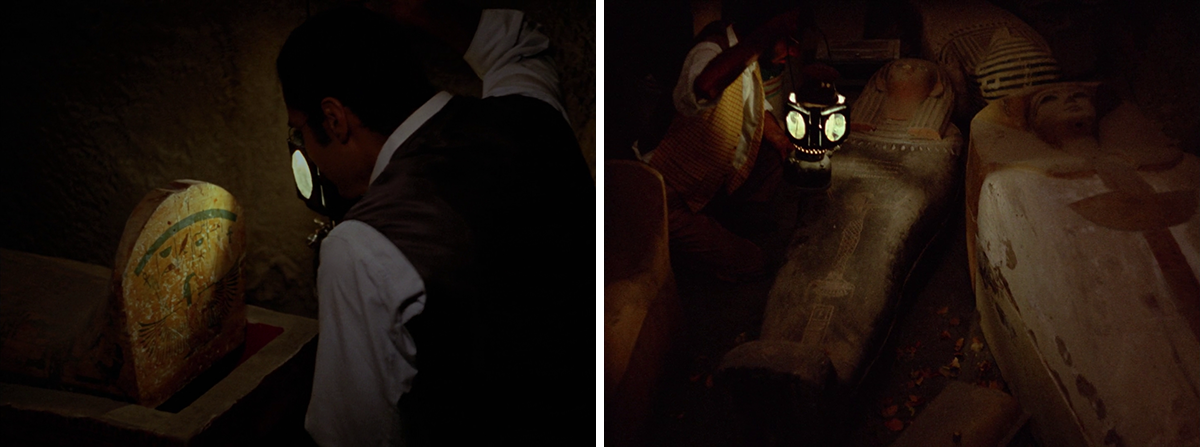
Scene XVIII
The Discovery
Interior then Exterior.
Ahmed Kamal descends by means of a rope to the bottom of the shaft. A lamp is handed to him. Lamp in hand, he enters a tunnel, looking carefully around him. He then halts, peering into the darkness before him. He sees a sarcophagus. He gets down nervously on his knees to read better. He reads silently. He then looks toward the sarcophagus’ mask (that of Seti I). He moves to another sarcophagus, and then to another, and reads the inscription in a ruff ink handwriting on the latter’s chest.
Voice of Ahmed Kamal (reading in his mind): We the high priests of Amon in the tenth year of the reign of Penndjem the great priest found the body of our lord the Great God Seti I, son of Ra, violated in its resting place in the great valley by the evil tomb-robbers. There we caused it to be carried to another place of safety and re-buried.
Two assistants, busy inspecting another sarcophagus, look up at Ahmed Kamal.
First Assistant: This reads: Ahmos! (Reads on sarcophagus, to make sure) 18th Dynasty!
The second assistant, beside another sarcophagus, reads:
Second Assistant: Amenophis the Great!
Ahmed Kamal, lamp in hand, walks among a sea of sarcophagi, shortly reaching yet another room full of sarcophagi.
Narrator (reading): I have come to be thy protection. I protect thee against him who caused thee damage. Thy bones are assembled for thee. Thy heart is brought to thee. Thy enemies are overthrown under thy feet. Thou art in thy beautiful image. Thou livest and arisest every morning, young again.
Ahmed Kamal stops and kneels down beside one of the sarcophagi (that of Thatmosis IlI). El- Badawy approaches him, stunned with what he sees around him. The two men are two shadowy figures lost between the forty sarcophagi of the mightiest Pharaohs of the empire.
Ahmed Kamal (continuing, in a different tone): I thought . . . I hoped to find the trace of the 21st dynasty. Instead I found the Pharaohs of five dynasties, from the 17th to the 21st dynasty!
El-Badawy: How did they come here?
Ahmed Kamal: The inscriptions on the sarcophagi state that they were transferred here 3000 years ago by the faithful priests at the fall of the empire. The mummies were placed in these humble sarcophagi after being stripped of their golden ones.
El-Badawy carefully kneels down beside Ahmed Kamal. He is restless.
El-Badawy: How many men have you?
Ahmed Kamal: Twenty only and I have here four assistants.
El-Badawy (almost whispering): What's to be done now? We risk an attack from the tribe of Horabat. We are outnumbered by them.
Ahmed Kamal (to his assistants): How many sarcophagi are there?
Assistant: About forty.
Ahmed Kamal: Be ready to carry them over to the ship. (After a deep moment of thought, to El-Badawy) Extinguish all torches as if all work had ceased.
El-Badawy: l'll gather all trustworthy hands among the valley dwellers.
Ahmed Kamal (to El-Badawy): Let none suspect what we are about to do.
At the mouth of the well.
Voice of a Guard: Extinguish the torches!
Voice of Another Guard: Extinguish the torches!
Voice of a Third Guard (as if he announces others): Extinguish the torches!
The guards in semi-circle extinguish their torches in the ground.
A sarcophagus rises from the shaft. Two assistants help lift it. A third assistant is seated nearby, recording.
Voice of Assistant: Ramesses the second.
Voice of Another Assistant: Number 7.
Thotmess II’s disfigured wooden sarcophagus is being lifted.
Voice of Assistant: Thotmess Il.
From the mountain top, guards throw ropes downward. Four men carry a huge sarcophagus and put it on beams. Ahmed Kamal observes carefully to make sure that the sarcophagus is well-baLanced. El- Badawy awaits on horseback looking at the dawn. Now on horseback, Ahmed Kamal observes the procession of sarcophagi as it descends a hill. El-Badawy gallops toward Ahmed Kamal.
El-Badawy: Quick! We are passing through the Horabat district. He rides on.The procession moves on.
The procession is now behind the mountain and Habu ruins. Tribesmen approach between two mastabas. Uncle, Murad, relative, cousins, and armed tribesmen stand in a tunnel-like passage. Uncle looks through a side opening at the procession. El-Badawy on his horse is visible through this opening. One, then a second sarcophagus advances, followed by El-Badawy, who stops, looks in susiciously for a moment, then moves on. Uncle turns to cousins.
Uncle: Attack! This is our last chance. Attack!
Cousin II (repulsed, whispering): The dead ... Was that our bread? Uncle picks a rifle, turns sharply round, and attempts to shoot at the procession. He falls calmly during the passage of the last sarcophagus. Murad runs away in terror.
Murad (whispering,frightened): I shouldn't be seen with you.
Cousin II (disdainfully): Go to the Effendies, dirt!
Murad stands terrified, trapped between the hostile cousins and the tribesmen with rifles. A moment of intense silence.
Relative: Let him go!
Relative passes cousins without looking at Murad. He approaches, looking sadly and fixedly towards Uncle. The tribe reluctantly makes way for Murad, who runs away. Relative advances toward the kneeling Uncle and stands beside him. Uncle stays motionless. The two remain static figures. Silence.
Relative: They have reached the valley.
The two Colossi of Memnon sit silently as the procession passes them: a silent farewell. Some people come running and halt. The whole procession passes along an elevated country road. Women in black approach. El-Menshiya is lit up, with guards awaiting. Sound of El-Menshiya’s shrill whistle. Wanys approaches, looking backwards from among the women. He covers his face and disappears into another group of women. Ahmed Kamal looks around El-Menshiya’s deck as he walks among many sarcophagi. He goes towards the railing and looks at the shore: groups of women in black and villagers. El-Badawy mounts his horse and salutes Ahmed Kamal. El-Menshiya moves away. The women in black move towards the boat. Wanys covers his face, and stands beside the Nile looking toward El-Menshiya drifting away. He then turns around and moves far away along the deserted shore. Guards on their horses accompany the ship from the shore. El-Menshiya drifts away all lit up like a jewel floating away on the river: The image is frozen and the following words superimpose on it:
Arise . . . thou shalt not perish. Thou hast been called by name. Thou hast been resurrected.
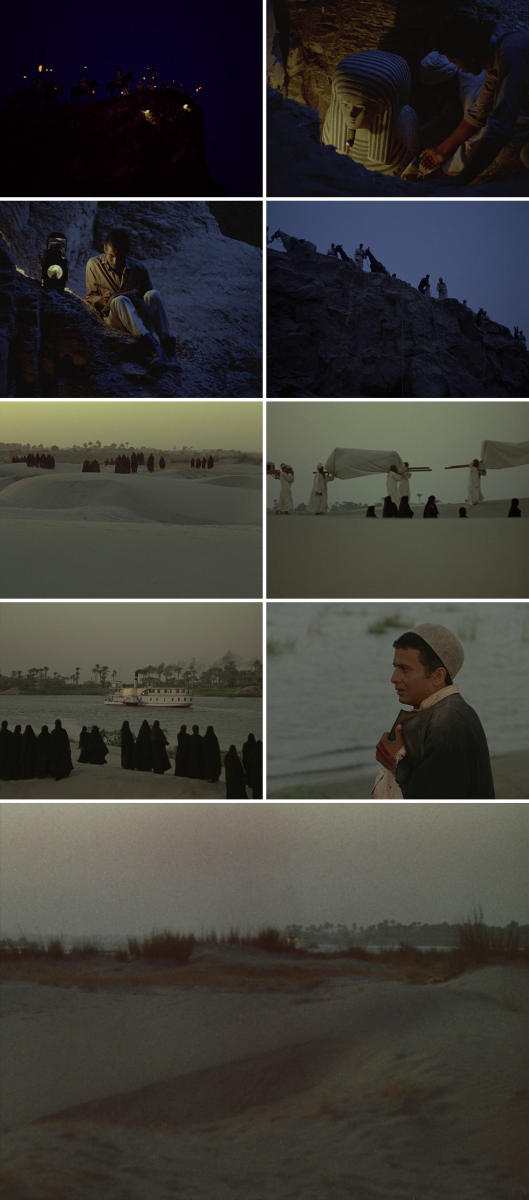
Group Rossellini, Caïro, September 1967
- 1Christiane Desroches-Noblecourt, Tutankhamen: Life and Death of a Pharaoh (New York Graphic Society, 1963) 50.
- 2James Henry Breasted, A History of Egypt: From the Earliest Times to the Persian Conquest (New York: Bantam, 1964) 439.
- 3C.W. Ceram, Gods, Graves, and Scholars: The Story of Archaeology, trans. E.B. Garside (New York: Alfred A. Knopf, 1951) 166-168.
- 4Emil Brugsch, qtd. in Leonard Cottrell, The Lost Pharaohs (New York: Holt, Rinehart and Winston, 1961) 151-152.
- 5Maspero, qtd. in Leonard Cottrell, The Lost Pharaohs 152-153.
- 6Leonard Cottrell, The Lost Pharaohs 153.
- 7E.A. Wallis Budge, The Book of the Dead: The Papyrus of Ani (New York: Dover, 1967).
- 8Budge, The Book of the Dead, Chapter XXV [from the Papyrus of Nebseni], 307.
- 9The mortuarty temple of Rameses II.
- 10The mortuarty temple of Rameses II.
- 11This section was shot at Saqqara
This text originally appeared in Discourse: Journal for Theoretical Studies in Media and Culture 21, no. 1 (1999).
With thanks to Jalal Toufic an Mary Sweetman.
© Wayne State University Press
Milestones: Al-mummia takes place on Thursday 21 January 2021 at 19:30 on Sabzian. You can find more information on the event here.

